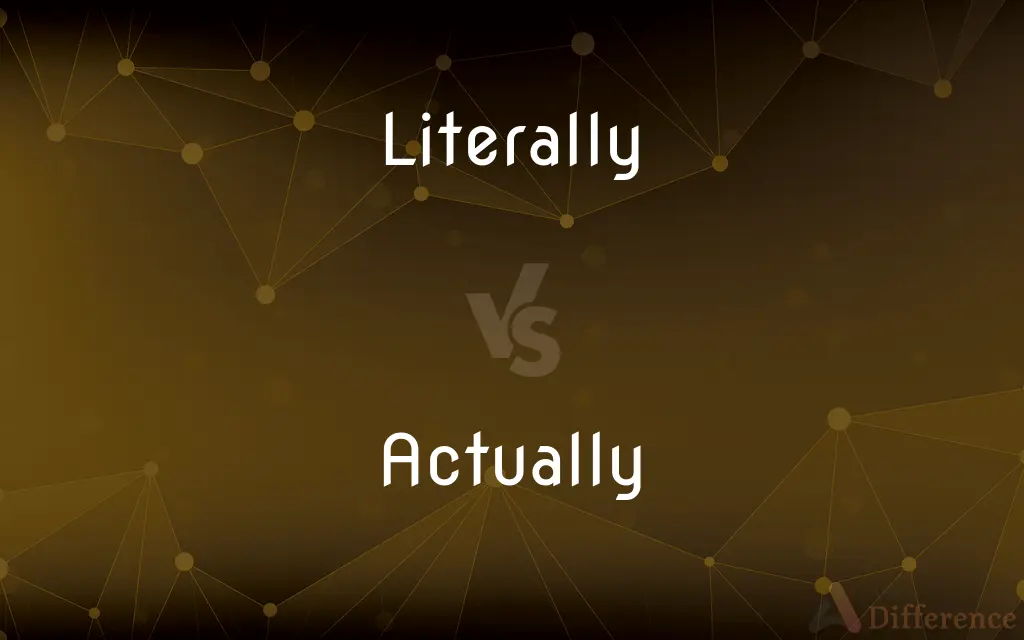Literally vs. Actually — What's the Difference?
By Fiza Rafique & Maham Liaqat — Updated on March 7, 2024
Literally means according to the strictest sense of the word, while actually implies something is true in fact.

Difference Between Literally and Actually
Table of Contents
ADVERTISEMENT
Key Differences
Literally is often used to emphasize that something is true in the most basic sense, without exaggeration or metaphor. For example, saying "I was literally blown away by the movie" suggests an extreme emotional reaction, though not physical movement. On the other hand, actually serves to clarify or counter a previous statement, often indicating that the reality is different from what might be assumed or expected. Saying "I actually enjoyed the movie" could imply that the speaker had low expectations or that there's a surprising element to the enjoyment.
Literally can also be used to stress the truthfulness or accuracy of a statement, even when it might seem unbelievable. For example, "She literally jumped three feet in the air" suggests a remarkable feat was achieved exactly as described. Conversely, actually might be used to introduce a fact that contrasts with what has been implied or stated before, as in "He looks young, but he's actually in his forties," emphasizing a contrast between appearance and fact.
The misuse of literally as an intensifier for figurative expressions has been a point of contention in language discussions. People might say, "I'm literally starving," when they are very hungry but not actually in danger of starving. Meanwhile, actually doesn't carry this confusion and is straightforward in indicating truth or fact, as in "I'm actually quite full."
In some contexts, literally and actually can be used interchangeably, especially in informal speech, to add emphasis or clarity. However, the choice between them can affect the tone and precision of the statement, with literally focusing on the exactness of words and actually on the reality of the situation.
Comparison Chart
Definition
In a literal manner; exactly.
In fact; in reality.
ADVERTISEMENT
Usage
To emphasize the truth of a statement in its exact sense.
To clarify or correct a previous statement or assumption.
Connotation
Can imply exactness or, when misused, hyperbole.
Implies a contrast with what might be expected or assumed.
Misuse
Often criticized for being used hyperbolically.
Less often misused; generally maintains its meaning.
Example
"I literally ran 5 miles this morning."
"I actually ran 5 miles this morning, not 3 as I thought."
Compare with Definitions
Literally
Exactly as described; without exaggeration or inaccuracy.
He took her words literally and left immediately.
Actually
In fact or in reality, contrary to what might be expected.
I know it looks odd, but it actually tastes delicious.
Literally
Used for emphasis, though often considered incorrect when used in exaggeration.
I was so surprised, I literally jumped out of my seat.
Actually
Used to introduce new information or correct a previous statement.
I thought it was Tuesday, but it's actually Wednesday.
Literally
In a literal sense; not metaphorically.
The term butterflies in my stomach is not meant to be taken literally.
Actually
Emphasizing a surprising fact or something contrary to popular belief.
She looks younger, but she's actually the oldest in the group.
Literally
Pertaining to the letters of a script.
The child read the word literally, without understanding its meaning.
Actually
Marking an actual situation as opposed to an idealized or hypothetical one.
We could speculate all day, but what actually happened is what matters.
Literally
Following the primary or strict meaning of the word.
The story was boring because the author described everything literally, with no figurative language.
Actually
Reflecting what is true or real in a situation.
I didn't expect to enjoy the play, but I actually did.
Literally
In a literal manner or sense; exactly
The driver took it literally when asked to go straight over the roundabout
Tiramisu, literally translated ‘pull-me-up’
Actually
Actually (stylised as Pet Shop Boys, actually.) is the second studio album by English synth-pop duo Pet Shop Boys. It was released on 7 September 1987 by Parlophone in the United Kingdom and by EMI Manhattan in the United States and Canada.
Literally
In a literal manner; word for word
Translated the Greek passage literally.
Actually
As the truth or facts of a situation; really
We must pay attention to what young people are actually doing
Literally
In a literal or strict sense
Don't take my remarks literally.
Actually
Used to emphasize that something someone has said or done is surprising
He actually expected me to be pleased about it!
Literally
Actually; in effect; practically. Used as an intensive to emphasize a figurative statement in an exaggerated way
“There are people in the world who literally do not know how to boil water” (Craig Claiborne). I was so angry that my heart literally exploded with rage.
Actually
In fact; in reality
That tree is actually a fir, not a pine.
Literally
Word for word; not figuratively; not as an idiom or metaphor.
When I saw on the news that there would be no school tomorrow because of the snowstorm, I literally jumped for joy, and hit my head on the ceiling fan.
Actually
Used to express wonder, surprise, or incredulity
I actually won the lottery!.
Literally
Used non-literally as an intensifier for figurative statements: virtually, so to speak (often considered incorrect; see usage notes)
He was so surprised, he literally jumped twenty feet in the air.
My daughter's pet rabbit had babies, and now we've literally got rabbits coming out of our ears.
On 9/11 people were literally glued to their TV sets.
Actually
(modal) In act or in fact; really; in truth; positively.
His promises did not correspond with what he actually did.
Literally
(colloquial) Used to intensify or dramatize non-figurative statements.
I had no idea, so I was literally guessing.
I was literally having breakfast when she arrived.
She was literally like, "What?", and I was literally like, "Yeah".
Literally who is this?
Actually
(obsolete) Actively.
Literally
(colloquial) Used as a generic downtoner: just, merely.
It's not even hard to make—you literally just put it in the microwave for five minutes and it's done.
It won't take me long to get back, cause the store's literally two blocks away.
Actually
(obsolete) Currently; at the time.
Literally
According to the primary and natural import of words; not figuratively; as, a man and his wife can not be literally one flesh.
Actually
Actively.
Literally
With close adherence to words; word by word.
So wild and ungovernable a poet can not be translated literally.
Actually
In act or in fact; really; in truth; positively.
Literally
In a literal sense;
Literally translated
He said so literally
Actually
In actual fact;
To be nominally but not actually independent
No one actually saw the shark
Large meteorites actually come from the asteroid belt
Literally
(intensifier before a figurative expression) without exaggeration;
Our eyes were literally pinned to TV during the Gulf war
Actually
Used to imply that one would expect the fact to be the opposite of that stated; surprisingly;
You may actually be doing the right thing by walking out
She actually spoke Latin
They thought they made the rules but in reality they were only puppets
People who seem stand-offish are in reality often simply nervous
Actually
As a sentence modifier to add slight emphasis;
Actually, we all help clear up after a meal
Actually, I haven't seen the film
I'm not all that surprised actually
She hasn't proved to be too satisfactory, actually
Actually
At the present moment;
The transmission screen shows the picture that is actually on the air
Common Curiosities
What's the best way to use "actually" in a sentence?
Use "actually" to introduce factual information, especially to clarify or correct.
How can using "actually" change the tone of a statement?
It can make a statement sound more factual or corrective, sometimes adding an element of surprise.
How does context affect the use of "literally" and "actually"?
Context can dictate whether their use is appropriate, especially considering formality and the intended emphasis.
Is it ever correct to use "literally" in a figurative sense?
While traditionally criticized, the figurative use of "literally" has become accepted in informal contexts for emphasis.
Does "literally" always mean "in a literal sense"?
Traditionally, yes, but its use has expanded to include emphasis, though this is often debated.
Can "actually" be used to express surprise?
Yes, "actually" can express surprise, especially when revealing a fact that contradicts assumptions.
Is "literally" only used for verbal exaggeration?
No, "literally" can also be used accurately to indicate that something happened exactly as stated.
Can "literally" and "actually" be used interchangeably?
In informal speech, they might be used similarly for emphasis, but they have distinct meanings and uses.
What is the impact of using "literally" incorrectly?
It can lead to confusion or weaken the intended emphasis if the audience expects the traditional meaning.
How does "actually" contribute to a sentence?
"Actually" can introduce a fact, correct a misunderstanding, or add emphasis to a statement.
Is it common to misuse "literally"?
Yes, its misuse as an intensifier for figurative statements is common, though increasingly accepted.
Are there situations where neither "literally" nor "actually" should be used?
Yes, when neither emphasis nor clarification is needed, their use might be redundant or overly casual.
Is it grammatically incorrect to use "literally" for emphasis?
It's not grammatically incorrect, but it can be seen as a misuse or informal depending on the context.
Can "actually" imply skepticism?
Yes, it can imply skepticism or correction when used to introduce a contrasting fact.
Why might someone choose "actually" over "literally"?
To clarify or correct information, or when emphasizing the reality of a situation rather than its exactness.
Share Your Discovery

Previous Comparison
Ocular vs. Ophthalmic
Next Comparison
Stop vs. QuitAuthor Spotlight
Written by
Fiza RafiqueFiza Rafique is a skilled content writer at AskDifference.com, where she meticulously refines and enhances written pieces. Drawing from her vast editorial expertise, Fiza ensures clarity, accuracy, and precision in every article. Passionate about language, she continually seeks to elevate the quality of content for readers worldwide.
Co-written by
Maham Liaqat















































